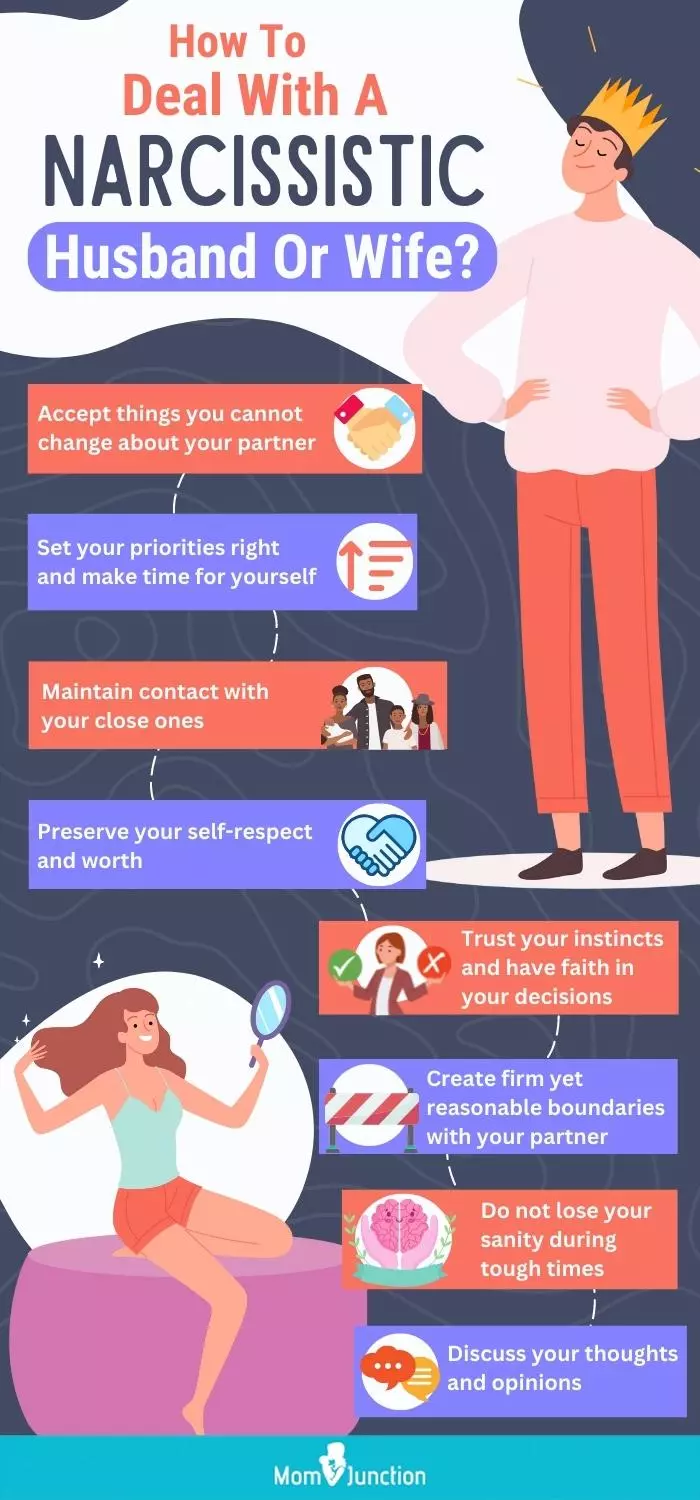
Image: iStock
A narcissist has an exaggerated sense of self-importance and self-worth. As a result, they want excessive attention and admiration from the people around them and generally lack empathy for others. If you are wondering how to deal with a narcissist husband or wife, reading our post can help you.
Living with a narcissistic partner is never easy. Narcissists usually have troubled relationships because they are self-centered and unmindful of their partner’s needs. They always prioritize themselves and try to manipulate their partners for their benefit. They want to be treated as superior and are dominant in a relationship. A narcissistic spouse can cause you emotional distress and psychological harm. However, ending a relationship isn’t always the way out, and you may want to understand narcissism before coming to any conclusions. This article outlines the types and signs of narcissism and provides practical ways to cope with a narcissistic spouse.

Key Pointers
- People with narcissism exhibit a self-absorbed attitude and a lack of care for others, which characterizes it as a personality disorder.
- Narcissistic behavior can cause extreme criticism, control, and jealousy that negatively affect the relationship between partners.
- To handle narcissistic partners, it is necessary to set clear boundaries and practice self-care to avoid mental or emotional abuse.
- Expressing concerns and seeking support from friends and acquaintances can help boost self-worth.
What Is Narcissism?
One of the easiest ways to identify narcissists is the extreme admiration they have for themselves. Narcissist people are those who love their own looks and appearance and are self-glorifying. Not only do they hold themselves in the highest self-regard, but also expect everyone else around them to think and believe so. A narcissist always seems to be extremely selfish, self-admiring, conceited, arrogant, inconsiderate, jealous, and vain. Another person would only matter to them for wish-fulfillment as they are self-serving. Narcissism is categorized as a mental and personality disorder.
Types Of Narcissism
Here are the different types of narcissism you may come across if you are in a relationship with one (1):
1. Vulnerable Narcissist

- Much against what you may watch out for, a vulnerable narcissist will be shy and an introvert. He would seem like someone who has an inferiority complex and the case may be so extreme that the person would go to any lengths to overcome it. (2)
- To hide feelings of shyness and low confidence, the narcissist will wear a mask of arrogance and self-hatred. In many cases, a vulnerable narcissist will try to project a feeling of being intensely unworthy.
- Especially with partners who seem confident about themselves, the narcissist may come off as too strong, over-confident, and loud. A narcissist will need to feel superior and special without any regard to what others may feel.
- One of the main reasons a narcissist behaves this way is out of the fear of rejection. The fear of being left alone or abandoned by the partner translates into wanting self-love and admiration. The narcissist may forget that loving and caring back is equally important.
 Did you know?
Did you know?- A vulnerable narcissist may resort to manipulative tactics such as self-shaming and guilt, to get the attention and sympathy of the partner.
2. Grandiose Narcissist
- The most common narcissists to identify, and hence, they are named grandiose. They are often referred to as invulnerable narcissists. Almost always, grandiose narcissists come across as highly confident and cold people who do not care about what their partners or other people may feel (3).
- In sharp contrast to the vulnerable narcissists, the grandiose narcissists will try to gain attention, admiration, and power by being very in-your-face. They will not mind the fact that people may look at them as being selfish, self-indulgent and self-centered. In fact, this would only boost them up.
- Unlike vulnerable narcissists, the grandiose ones consider themselves above everyone else, their partners even. They do not consider anyone better than themselves and would, therefore, not treat others with respect and admiration. In fact, if anyone treats them as though they are ordinary people, it often surprises and infuriates them. They demand that others recognize their superiority.
- In order to get the admiration, approval, respect, and complete acquiescenceiThe act of unwillingly or willingly accepting something without any protest of their partner, the grandiose narcissist frequently resorts to emotional manipulation, including rage attacks, shaming, making the partner feel guilty or worthless, and more.
3. Malignant Narcissist
- It is a severe form of narcissistic personality disorder that can significantly impact one’s quality of life.
- While sharing common traits with narcissism, such as a strong need for praise and superiority, malignant narcissism manifests in vindictiveness, sadism (deriving pleasure from others’ pain), aggression in interpersonal interactions, and heightened paranoia about potential threats (4).
4. Cerebral Narcissist
- Cerebral narcissist seeks narcissistic supply by showcasing their intellect and intelligence consistently.
- Their toxic nature becomes evident as they belittle others, especially if they perceive them as less intelligent.
- With extreme arrogance and egoism regarding their intellect, they seize every opportunity to diminish others.
- Their intelligence is wielded as a tool for establishing authority, making them demanding and unsparing in their pursuit of a superior position, often involving managing or ruling over others.
7 Signs Of Narcissistic Husband Or Wife
You may have already sensed it, or maybe you feel that’s just how your partner is. But if you constantly notice the following signs in your partner, chances are, you are involved with a narcissist:
1. Always talks about self

Whatever the setting, your partner will be self-obsessed and always take the lead and talk about themselves. They are so self-preoccupied that if you tried to deviate from their conversation, you would be given only a small window to talk, and your partner would move to talking about themselves again. Voicing opinions or ideas could be difficult. Also, if you say something that does not align with your partner’s views, he or she will try to correct you, or ignore it outright. You may also notice that in an effort to do so, your partner may come across as being loud, obnoxious, rude, egotistical and arrogant.
2. No rules apply
Those who have narcissist tendencies always think of rules as something that is beyond their dignity to follow. Simple habits like following the traffic rule or respecting a time commitment will not be something your partner will honor. In fact, your partner may go all out to specifically break a rule and show that it just does not matter to them.
3. Looks will always be first priority
For many narcissist partners, looks are the top-most priority, as making the first impression will be of extreme importance. They are self-promoting and will spend a lot of time preening and taking care of looks, including clothes, shoes, accessories, perfumes, and such. In most cases, how you dress up or the way you look will rarely matter to him or her, as you will always remain the secondary one in the relationship. Once your partner is ready, you will be expected to admire and appreciate your partner on looks and tell them how amazing they look.
4. Charming glory
When your partner wants to make you agree to something, be assured that you will be charmed off your feet. A narcissistic spouse can almost always get out of any sticky situation, by using the biggest magic trick of all – charm. In most cases, you may not even realize that this is how it played out, but when you look back and think upon it, you will see how you were manipulated to make a decision, according to them.
5. Can get easily offended
It is very easy to tick off your narcissist partner and send him or her into a spell of negative moods. One of the surest ways in which you will know that your partner is a narcissist is if each time you disagree with your partner or fail to give him or her attention, there will always be a temper tantrum or a sulking phase. Your partner will be offended if you do not give them enough time, as perceived by him or her. High praise and the best human awards are also what your partner is looking for. He or she always wants to be shown around as the best person. If you fail to do so, be ready to bear some sulking and guilt feeling of having neglected them.
 Do remember
Do remember6. Greater than everyone else
Your partner may or may not love you as much as you love him or her, but they will still believe that you have the best partner in the world. They are self-seeking, self-loving, and self-aggrandizing. For a narcissist person, every relationship is about themselves. Your partner will genuinely feel that he or she is nothing short of a celebrity, and as a result, will feel entitled to special treatment and adoration. With this self-entitlement and huge self-image in mind, your partner will believe that you cannot live without him or her, no matter what you are getting out of the relationship.
7. No concept of boundaries
Narcissists do not understand what it means to give someone their space and how to respect social boundaries. It means that as a partner, your significant other will not take into consideration the fact that their action could hurt you, or that you may not always agree with what they do. Your partner may borrow your money or any prized possession and not bother to return it. It becomes a recurring habit, one that your partner will also display while dealing with others. And it does not stop at materialistic things. It moves to not respecting your schedule, work, etc. You might feel that they are treating you as though you were a part of themselves, maybe a third arm.
Data collected from 34,653 participants in face-to-face interviews showed gender differences in narcissistic traits. The statistics from the study revealed that men are more likely to develop NPD (narcissistic personality disorder) characteristics than women. The study also suggested that the prevalence of lifetime NPD was 6.2%.

Prevalence of narcissistic personality disorder by gender
Source: Narcissistic Personality Disorder Statistics; Grace being/The Journal of Clinical Psychiatry6 Possible Causes Of Narcissism
There are no definite causes that are known to lead to a narcissistic personality disorder. While some experts feel that the root of narcissism lies in events that may have taken place in the person’s childhood and influenced him accordingly, others feel that being exposed to a narcissist at a very young age could lead to narcissism.
Here are some of the most common causes which experts feel could lead to narcissism, though there is no definite proof of the same(5).
1. Too pampered as a child
If the child is always pampered by parents and other members of the family, he or she may grow up feeling extra-special and superior.
2. High parental expectation
When parents have extremely high expectations from the child, it creates undue pressure and leads the child to turn into a person who always tries to please people. Even though the child may not enjoy it, he or she will always try to match up to the parent’s expectations and suffer from guilt when unable to do so.
3. Feeling neglected

Not getting enough attention from parents can lead to feelings of neglect. As a result, the child may grow up and demand absolute attention, time, and devotion from the partner.
4. Witnessing abuse as a child
In certain cases, a child could grow up to be a narcissist if he or she has faced some kind of abuse such as physical violence, abusive language, threatening body language. This could either have been inflicted upon them or on any of their family members.
5. Genetic inheritance
Narcissistic personality traits could also be linked to the genetic makeupiThe expression of genes in a person’s DNA that influences their characteristics , where the brain behaves, thinks, and reacts in specific ways to specific situations and triggers.
 Point to consider
Point to consider6. Unable to vent feelings as a child

If as a child, one is asked to constantly mask emotions as it could seem like a sign of weakness, it could turn into a negative character trait. Growing up like this, the child will not be able to understand others’ emotions and will not be an empathetic person.
Can Narcissism Point To Something Else?
In a few cases, a narcissistic person could have had a narcissistic parent and grew up witnessing the effects first-hand. Narcissistic parents offer their children various chances to develop but provide no real motivation, support, or love. For instance, a narcissistic parent will want a genius for a child, to prove their superiority as a parent. However, they will not offer any real support or guidance to help the child be one and may simply demand that it be so.
If your partner has a narcissistic personality trait, it could mean that he or she felt abandoned or was not loved as a child. Also, your partner may have had to struggle a lot as a child to get what they needed. They would have had to put in a lot of effort to move out of any feelings of self-despair and confusion.
6 Adverse Effects Of Narcissism On Relationship
When you are in a relationship with a narcissistic personality, chances are your relationship will be in a downward spiral. Here are a few ways in which your partner’s narcissism can strain the relationship: (6)
- No unconditional love: Your partner will never be able to love you fully. Most narcissists have trouble loving and accepting their own self for the way they are.
- Unable to understand your needs: Being too focused on his or her own needs, your partner will never be able to understand the extent of your needs in the relationship.
- Take you for granted: As your partner will have a very grand feeling about his or her image, they will almost always take you for granted. You will be the partner in the relationship who will always be there, no matter what. As a result, your partner will not make any extra efforts to make sure you feel happy or loved.
- No control over your life: While you are in a relationship with a severe narcissist, you will start to lose control of your views, opinions, your choices and very soon, almost all aspects of your life. Your partner will very convincingly control you and in time, will also start taking decisions on your behalf. The following effect may be that you may start reflecting your partner’s views, and actions.
- Extreme jealousy and loss of social life: It is one of the weird things narcissists do. Your partner will tend to get jealous very soon and may take your inattention as a sign of disinterest. It could reach a point where your partner could accuse you of being unloving and uncaring. Also, your partner may start getting uncomfortable with your other relationships, such as your relationships with your friends, co-workers, or family, and demand your hundred percent attention, time, and love.
- Loss of self-worth: Your narcissistic partner will never be happy in the relationship, and there will be times when you will feel guilty and responsible for the same. You may think that you are not good enough for your partner and that the reason your partner is not happy is because of your failings. Soon your feelings can turn inward, and you will hold yourself responsible for your partner’s negative attitude. You may also develop more severe issues such as anxiety, depression, and low self-esteem.
Long-Term Effects Of Living With A Narcissist
Living with a narcissistic partner exposes you to narcissistic abuse, a covert form of emotional abuse that causes psychological damage. It can also hamper your emotional, physical, and social well-being. Studies show that people in relationships with those high in narcissistic traits reported high levels of anxiety, depression, self-aggression, sickness, and other concerns (8). Here are some other long-term effects of narcissistic abuse.
1. Emotional And Psychological Effects
- Low self-esteem and self-doubt: Exposure to persistent manipulative behavior and gaslighting can erode your confidence and self-worth, making you question your value and feel guilty and inadequate.
- Anxiety and depression: Living in a high-stress environment, thanks to the emotional abuse inflicted on you by the narcissist, can cause you to develop chronic mental health issues.
- Complex PTSD (C-PTSD): Ongoing emotional trauma due to long-term exposure to the narcissistic husband or wife’s cruelty can cause you to become hypervigilant and suffer emotional dysregulation, numbness, and executive dysfunction.
- Moodiness and learned helplessness: Feeling angry at your abuser while feeling powerless at the same time is not uncommon. You can also experience mood swings, irritability, or even emotionlessness (9) (10).
2. Cognitive And Behavioral Effects
- Brain fog and confusion: Being gaslit and emotionally manipulated for a long time can have lasting effects on your memory, concentration, and decision-making abilities.
- People-pleasing and codependency: As a survivor of narcissistic abuse, you may struggle to set boundaries and develop a habit of prioritizing others before yourselves.
- Trauma bonding: You may feel anxious when you are not with your abusive husband or wife because you have trauma-bonded with them through cycles of intermittent kindness and abuse (10).
- Difficulty trusting others: After realizing you’ve been through prolonged betrayal and manipulation, you can struggle with trusting others, making future relationships challenging.
3. Physical Health Effects
- Stress and fatigue: When you are under constant emotional distress, you may suffer from adrenal fatigue and overall exhaustion (11).
- Headaches, body aches, and digestive problems: Long-term stress can manifest in physical symptoms like migraines, IBS, autoimmune conditions, muscle tension, and other stress-related conditions.
- Sleep disorders: Many people who suffer from narcissistic abuse struggle with insomnia, nightmares, and frequent sleep disruption due to anxiety and trauma.
- Panic attacks: You may hyperventilate and experience panic attacks when certain situations trigger you, reminding you of the abuse you’ve been through (10).
4. Relationship, Life, And Social Effects
- Isolation and social withdrawal: After living with a narcissist for a long time, you may lose friends and family connections due to your partner’s control or because you feel misunderstood.
- Attracting toxic relationships: When you enter a new relationship before healing from narcissistic abuse, you may unconsciously fall into similar abusive patterns in future relationships.
- Financial instability: Your narcissistic wife or husband may have used financial abuse to control you, which may have left you with debt or no resources after you’ve separated.
- Career and ambition setbacks: When you are emotionally and physically exhausted, lack confidence, and have been sabotaged by your partner, your career growth is likely to be impacted.
How To Deal With A Narcissistic Husband Or Wife?
- Do not give in to your partner’s attention-seeking tactics. Appreciate that these are driven by their insecurity and that this is not an insecurity that you can ever change. Instead, tell yourself that it is alright to take time out for yourself and spend it the way you want to
- Tell yourself that you are a wonderful person who is capable of loving and making smart decisions. Keep your self-worth on one of your higher priority points and make sure you remind yourself each day that you deserve love, respect, and admiration.
- If you are trying to work on the relationship but feel constantly criticized, get in touch with people who are aware of your nature and speak to them. Go out and meet friends, talk to them over the phone, and reassert your importance and your goodness as a human being.
- Understand that you may never be able to change your partner’s personality. Ask yourself if you wish to live like this forever.
- Think of the gestures your partner has made that made you feel loved and happy. It will help to reaffirm your faith in your partner and the relationship as a whole.
- Do not shy away from sharing your feelings with your partner. If you feel unloved and unworthy in the relationship, tell your partner about it without worrying that it will hurt your partner. Be honest in your communication and talk without fear.

- Tell your partner about the things that are not acceptable to you in a relationship. Learn how to disarm a narcissist, whether it is your spouse or long-term partner, and set firm but reasonable boundaries. Also, make sure you tell your partner the consequences of breaking boundaries but do so without sounding admonishing or punishing.
- When it becomes impossible to communicate with your partner, consider joining a support group or seeking professional help. Their guidance, insights, and support may help you understand your next steps.
How To Cure Or Stop Narcissism?
The main way to treat narcissism is through psychotherapyiA counseling session with a trained professional for the treatment of any psychological, emotional, or behavioral disorders , which is often a long-term treatment option. Here are a few things that could help: (7)
- Help the person relate better with others and form a stronger and love-filled relationship.
- Understand what causes negative emotions and learn how to better deal with them in a positive manner.
- Understand self-potential so that it becomes easier to accept criticism and act on them.
There are no medications that are used for treating narcissism. However, if your partner has any additional symptoms, such as depression, anxiety or other issues, the doctor may prescribe required medication.
How To Control Your Narcissism?
It is difficult to take charge of your narcissism, but with time and patience, the following steps can help:
- Each time you get upset by an act or comment, take some time out to understand why that specific action happened. Understand what you did that led to such a reaction. Identifying your triggers will be the first step to successfully handle narcissism.
- Cut yourself some slack and understand that it is okay to not be perfect all the time. Success and failure are a part of life, and just as you may be successful in a lot of things you do, it is also alright to fail at certain areas in life.
- Connect with others who you know are better than you think. If you feel you are better than everyone you know of, join a class and follow an instructor where you can surely learn something new. Learning to follow instructions and acknowledging someone else as superior to you in any field is also a good way to tell your mind that you are not the most superior person around.
How To Move Out Of A Narcissistic Relationship?
Ending a relationship is always painful, and one in which you are involved with a narcissist can get even more difficult to move out of.
Colleen Sheehy Orme shares her experience of dealing with a narcissistic ex-husband. She says, “When I was still married to a narcissist I teased myself into believing he wasn’t who he was. It’s one of the reasons I underestimated divorcing a narcissist. The day I told my husband I was thinking of leaving him…He responded with emotional blackmail. ‘If you leave me I will make sure there’s no money,” said my narcissist. “And you work for the rest of your life.’
“Again, I teased myself. It’s just anger. The kind of thing people say when a marriage is crumbling… I would later learn an important lesson. Believe a narcissist when they threaten you. I divorced an unrelentingly punishing narcissist who inflicted an overly long and abusive five-year divorce on our children and me (i).”
Narcissists are usually charmers and great at manipulating you, so even if some part of you may feel that you need to move out, you may not be ready to do so. Here are a few things you should consider if you are breaking up with a narcissist or moving out of a narcissistic relationship:
- Stop blaming yourself for everything that goes wrong in your partner’s life. If your partner continues to make you feel responsible, ask him or her to stop it right then.
- Understand that your partner will never change in his or her ways, and tell yourself that you deserve better.
- Start voicing your displeasure and hold your ground.
- Start spending time outside your relationship in activities that make you happy. Don’t make your life all about your partner’s wants and needs.
- Start alienating yourself physically as well as emotionally. Each time you feel you are unfair to your partner, tell yourself that you are fair to yourself instead.
- If you are not able to say it out loud, write a letter to your narcissist partner and explain why you are moving out, and pour out all your hurt and anger.
Frequently Asked Questions
1. Can a narcissist be a good spouse?
No. Having a narcissistic spouse can be a challenging experience as they only think about themselves in the relationship. Due to their self-obsession, they don’t care about their partner and make everything about themselves.
2. Can a husband and wife both be narcissistic?
Yes, it can be possible for a narcissistic couple to come together. However, the relationship can be rocky at times, and both should put in a deliberate effort to look beyond themselves and care for each other.
3. Do narcissists cheat in marriage?
There is a high possibility that a narcissistic person will cheat on their partner. Narcissistic people constantly need attention and validation from others, and when they don’t get enough attention from their partners, they will look for it from someone else.
4. What steps should I take if I realize my partner is a narcissist?
When you first realize that your spouse is a narcissist, aim to educate yourself on narcissism and list the traits you see in your partner. Then, try to establish healthy boundaries. Consider therapy for support and guidance and find healthy coping mechanisms. Prioritize yourself and your mental health, and then proceed to figure out what should become of your relationship.
When you are in a relationship with a narcissist, your life revolves around your partner. Their extreme self-admiration makes you do things they like. They don’t understand space and boundaries and can easily get offended if you don’t give them attention. If your partner has one or more of these warning signs of a narcissistic husband or wife, set clear limits and tell them what’s acceptable and what’s not. You can try several things to take your husband out of narcissism. However, if your relationship feels toxic, voice out your displeasure and call it quits without blaming yourself.
Infographic: Ways To Deal With A Narcissistic Spouse
Staying with someone who has narcissistic personality traits can take a toll on your overall health. So, whether you want to reestablish your association with your spouse or wish to set healthy boundaries with them, read through this infographic to learn some helpful tips to deal with a narcissistic partner. Illustration: Momjunction Design Team
Illustration: How To Deal With A Narcissist Husband Or Wife: 6 Ways to Move On

Image: Stable Diffusion/MomJunction Design Team
Are you facing challenges in your marriage? Learn about the different dynamics within your relationship and how narcissistic husbands treat their wives in this informative video!
Personal Experience: Source
MomJunction articles include first-hand experiences to provide you with better insights through real-life narratives. Here are the sources of personal accounts referenced in this article.
i. 13 unfortunate realities I learned while divorcing a narcissist.https://medium.com/beloved/13-unfortunate-realities-i-learned-while-divorcing-a-narcissist-7d0186ff12fd
References
- Schoenleber M et al.; (2011); Parallel syndromes: two dimensions of narcissism and the facets of psychopathic personality in criminally involved individuals.
https://www.ncbi.nlm.nih.gov/pmc/articles/PMC3368369/ - Kelly A Dickinson and Aaron L Pincus; (2017); Interpersonal analysis of grandiose and vulnerable narcissism.
https://pubmed.ncbi.nlm.nih.gov/12839099/ - Grandiose Narcissism Predicts Willingness to Behave Badly Badly Without Proportional Tolerance for Others’ Bad Behavior.
https://digitalcommons.trinity.edu/cgi/viewcontent.cgi?referer=&httpsredir=1&article=1127&context=psych_faculty - Malignant narcissism: From fairy tales to harsh reality
https://www.researchgate.net/publication/46381695_Malignant_narcissism_From_fairy_tales_to_harsh_reality - Narcissistic Personality Disorder.
https://my.clevelandclinic.org/health/diseases/9742-narcissistic-personality-disorder - Narcissistic personality disorder: effect on relationships
https://www.ncbi.nlm.nih.gov/pubmed/23472440 - Narcissistic Personality Disorder
https://www.mayoclinic.org/diseases-conditions/narcissistic-personality-disorder/diagnosis-treatment/drc-20366690 - Nicholas J. S. Day et al.; (2025); Pathological narcissism: An analysis of interpersonal dysfunction within intimate relationships.
https://pmc.ncbi.nlm.nih.gov/articles/PMC9541508/#abstract1 - The Long-Term Effects of Narcissistic Abuse.
https://www.ashleytreatment.org/rehab-blog/long-term-effects-narcissistic-abuse/ - Understanding the long-term impacts of narcissistic abuse.
https://bartonfamilylaw.com.au/blogs/child/understanding-the-long-term-impacts-of-narcissistic-abuse/ - Adrenal fatigue: What causes it?
https://www.mayoclinic.org/diseases-conditions/addisons-disease/expert-answers/adrenal-fatigue/faq-20057906
Community Experiences
Join the conversation and become a part of our nurturing community! Share your stories, experiences, and insights to connect with fellow parents.
Read full bio of Vincenzo Sinisi
Read full bio of Kalpana M
Read full bio of Shikha Thakur
Read full bio of Benidamika J Latam

















